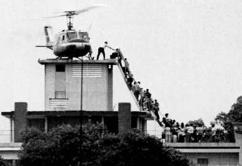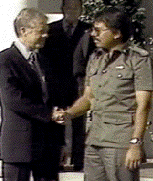The Baker plan for Iraq: Strategic vision or tactical political dodge?
He has a well-earned reputation for grinding down his opponents and dispatching his enemies. He is a gentleman who wields a sharp political dagger. He's pulled many a protruberance from the wringer.
He knows how to fight and he knows how to win.
But counting hanging chads on Florida ballots isn't the same as winning in Iraq. And this is where Baker appears to be falling down. He didn't run the George W. Bush campaign and do what he did in Florida in order to "settle" something. He did it to win.
In domestic politics, James Baker lives and breathes for victory. But as his record as secretary of state shows, he doesn't seem to know the word when fighting battles beyond America's borders. And that has had terrible consequences for the world, which is why his Iraq recommendations are unlikely to be fruitful.
Let's look at the record.
1. Nicaragua - aren't we all sick of it by now? - was a domestic political headache for Baker, both when he was in the Reagan White House and when he was Bush 41's secretary of state. He understandably wanted to wash his hands of Nicaragua when he took over the State Department, and rid President George H. W. Bush of the stink.
So what did he do? He disposed of the problem as if he was taking out the kitchen garbage. He forced the pro-US Nicaraguan Resistance army to disarm unilaterally, but didn't try to make the Sandinista communists do the same. He pledged that the US would support the pro-American fighters as they transitioned into a democratic political process.
What he really did was toss them to the wolves. He did nothing as the Sandinistas picked off more than 120 former contra commanders, assassinating them one by one. He broke America's promise to that small country. Nicaragua remains a basket case, and Hugo Chavez just funded the return of Daniel Ortega to office.
2. Soviet Union. When President Reagan's loyal aides were developing and executing the strategy to undermine the Soviet empire - a policy that became known as the Reagan Doctrine - Baker was fighting his own battles in the White House. Through press leaks and bureaucratic maneuvering, he tried repeatedly to prevent Reagan loyalists from fulfilling the president's agenda, and often succeeded in neutralizing them by damaging their reputations or getting them fired. This is a story that remains to be told in detail.
When he became Secretary of State in 1989, the Soviet Union was collapsing. By the summer of 1991, when it was all over for the Kremlin, Baker tried to keep things together. He didn't encourage the democratic and national independence movements. He didn't even encourage Russian President Boris Yeltsin who was trying to get Russia to secede from the USSR.
He gave the appearance of siding with the leaders of the Soviet Communist Party who were desperately trying to avert a collapse. He was particularly concerned that Ukraine would secede. Witness his involvement in the elder Bush's notorious "Chicken Kiev" speech.
3. Afghanistan. This is arguably the worst of all. As with Nicaragua, Baker wanted to cut off America's Afghan allies as soon as the Soviets pulled out. He got his way when he became secretary of state in January, 1989.
The last Soviet forces pulled out of Afghanistan that February. Ahmad Shah Massoud, leader of the non-Islamist and arguably pro-American Afghan resistance army, warned us repeatedly not to abandon Afghanistan after the Soviet pullout.
To do so, Massoud warned, would leave Afghanistan to the clutches of Pakistan's ISI intelligence service, which was dominated by Islamist extremists who sought to turn Afghanistan into a Wahhabi theocracy. The ISI had diverted significant covert American aid to the fanatical Islamist Afghan guerrilla factions, often at the expense of Massoud's forces. Massoud needed the US to stay involved - and in a big way.
But Baker cut and ran. He closed his eyes as his friends in Saudi Arabia and Qatar bankrolled the Wahhabi warlords and guerrillas, undermining the new government of President Burhanuddin Rabbani, whom Massoud served as defense minister, and setting the stage for the Taliban and, ultimately, nobodies like Osama bin Laden.
Even when the Saudi monarchy's very existence was at stake after Saddam Hussein's invasion of Kuwait, Baker failed to leverage American military support on Saudi behavior abroad. (Let's forget for the moment that his own ambassador to Baghdad, April Glaspie, told Saddam to his face something that led him to believe that the US would not defend Kuwait were he to invade.)
After Saddam rightly or wrongly took the cue, Secretary Baker brilliantly organized an after-the-fact international coalition to join the US in repulsing Iraq from Kuwait, but that was all. The administration encouraged Iraq's beleagured Shi'ites to rise up against Saddam, but Baker never had any intention to help them. And, of course, he never had the "vision thing" that would allow a plan to knock off Saddam when the dictator was down.
But he did support the stationing of American troops in Saudi Arabia to defend the House of Saud - the very policy that Osama bin Laden would use to justify his twisted jihad.
This is not 20/20 hindsight. Although almost nobody had ever heard of bin Laden at the time - and one cannot fairly accuse Baker of not having predicted the rise of bin Laden as an individual - others clearly and openly predicted the rise of Islamist extremism, knew about Saudi funding of Wahhabi extremism including among Afghan guerrilla factions, and warned against inflaming devout Muslims by keeping troops in Saudi Arabia, among other things.
James Baker is a gifted politician. But he is a tactician, not a strategist. On international affairs he has shown tactical brilliance but a horrid lack of strategic vision. His timeframe seems to be up to the next domestic presidential election. But his record shows he is content to leave crises to fester for future generations. And that's where he falls down as a statesman.








